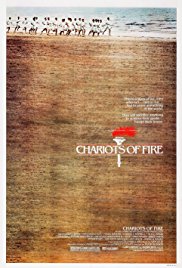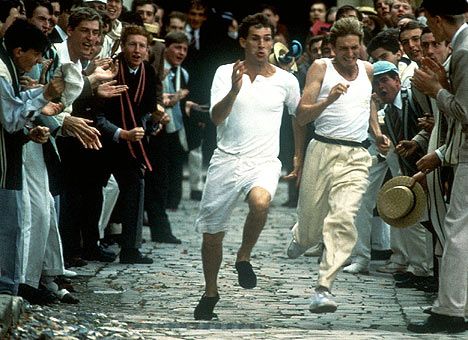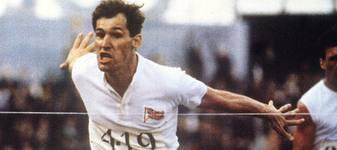For English Language Arts classes:
Distribute TWM’s Film Study Worksheet. Teachers can modify the worksheet to fit the needs of each class. Ask students to fill out the worksheet as they watch the film or at the film’s end.
Some run for England; one runs to prove himself and his people, and one runs for the glory of God. This movie follows the college and Olympic careers of four members of the 1924 British Olympic track team. It is a film about real people and real events.
Selected Awards: 1981 Academy Awards: Best Picture, Best Supporting Actor (Holm), Best Costume Design, Best Original Screenplay; Best Music; 1981 New York Film Critics Awards: Best Cinematography; 1982 Golden Globe Awards: Best Foreign Film; 1981 Academy Award Nominations: Best Director (Hudson), Best Film Editing.
Featured Actors: Ben Cross, Ian Charleson, Nigel Havers, Ian Holm, Alice Krige, Brad Davis, Dennis Christopher, Patrick Magee, Cheryl Campbell, John Gielgud, Lindsay Anderson, Nigel Davenport.
Director: Hugh Hudson.
“Chariots of Fire” describes some of the reasons why people become fiercely competitive, introduces the Scottish missionary movement, acquaints the viewer with early Olympic competitions, and shows England in the 1920s, including the anti-Semitism of some people at that time. The movie is rich in detail and very uplifting.
As your child watches this film, go through several points in the Helpful Background section. This will add depth and background to the story.
The most prestigious universities in England are Oxford and Cambridge. They are ancient institutions, dating from the Middle Ages. Each university is divided into colleges, which are in friendly competition with each other.
Musicals by Gilbert and Sullivan have been popular since they were written in the late 19th century. They are still performed today. The most notable is The Pirates of Penzance, “HMS Pinafore” and “The Mikado.” At many colleges in England (and some in the United States), there are Gilbert and Sullivan societies which perform Gilbert and Sullivan operettas. Abrahams was active in the Gilbert and Sullivan society at Cambridge. His girlfriend was a star of professional productions of Gilbert and Sullivan operettas. See The Pirates of Penzance.
The oldest son of the reigning English monarch and the heir to the throne is given the title of the Prince of Wales. In England, there had been a distinction between “gentlemen,” whose wealth was inherited and usually based upon the ownership of land and “tradesmen” who made their money as merchants or industrialists. Members of the British upper class wanted to avoid being considered “tradesmen.”
The English and Scottish Protestant churches supported active missionary movements including missions to Africa and China. The Liddell family was part of this movement. Eric Liddell thought of his running as a service to the mission and to God. He says, in the movie, “To give up running is to hold Him in contempt. To win is to honor Him.”
There are several references at the beginning of the film to the horrendous price paid by Britain in the First World War. The porters helping the Cambridge students with their luggage as they arrive at school had both been injured in the Great War. They wear their medals on their civilian clothes. The Freshman dinner takes place in a room dominated by “the War List” a very long list of names of Cambridge graduates killed in WWI.
Abrahams’ father was an immigrant to England from Eastern Europe, Lithuania to be exact. The English social and economic system had allowed him to become wealthy and send his sons to the best schools. (Abrahams’ brother was a doctor and Abrahams attended Cambridge.) While there was still prejudice against the Abrahams because they were Jewish, they were permitted to prosper and to contribute to English society. This pattern of immigrants prospering and contributing to their new homeland occurred much more often in the United States than in England.
QUICK DISCUSSION QUESTION:
The great losses suffered during the First World War were an ever present factor in the lives of Englishmen in the 1920s. Describe at least two scenes from the film which show this.
Suggested Response:
The porters who help the students with their luggage were seriously injured in the war. They wear their medals on their clothes. The dining room of the college has a long list of war dead, the “War List,” dominating the room.
1. See Discussion Questions for Use With any Film that is a Work of Fiction.
SPORTSMANSHIP
1. Abrahams was not accustomed to losing and didn’t take it very well. He referred to his last Olympic race as “. . . ten lonely seconds to justify my whole existence.” What did he mean by this? What was running to him? Was this a healthy attitude?
2. What did the trainer, Sam Masubene, mean when he said that neurotics were the best runners for the 100-yard dash? Do you agree?
Discussion Questions Relating to Ethical Issues will facilitate the use of this film to teach ethical principles and critical viewing. Additional questions are set out below.
TRUSTWORTHINESS
(Be honest; Don’t deceive, cheat or steal; Be reliable — do what you say you’ll do; Have the courage to do the right thing; Build a good reputation; Be loyal — stand by your family, friends and country)
1. Was Liddell correct in refusing to run on Sunday in a “respectful but firm resolve to do what was right?” The Prince of Wales asked him to be patriotic and run on Sunday for the benefit of his country. Here, two parts of the same Pillar of Character conflict. Think about what Liddell said about why he ran. What choice would you have made? Why?
2. Why was the observation of the Sabbath so important to Liddell that he would miss an Olympic race to observe it?
3. Was Abrahams correct in being sensitive to anti-Semitic comments by others?
BUILDING VOCABULARY:
begat, “the War List,” freshman, Fabian Society, anti-Semitism, neurotics, plebeian, Sabbath.
Books recommended for junior high and middle school readers include One Goal by John Towers and Arthur C. Kaminsky (about the 1988 U.S. Olympic Hockey Team).
Last updated December 9, 2009.




